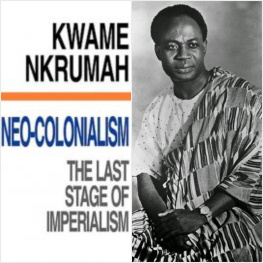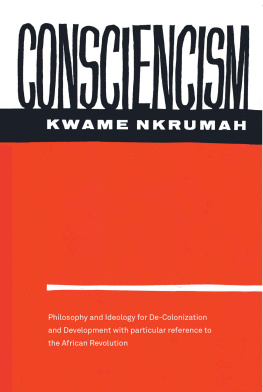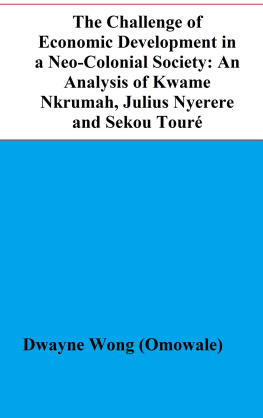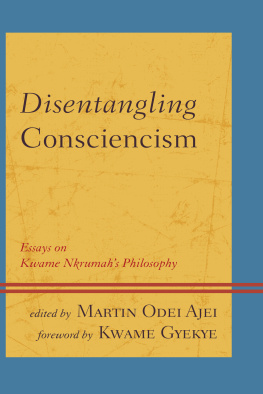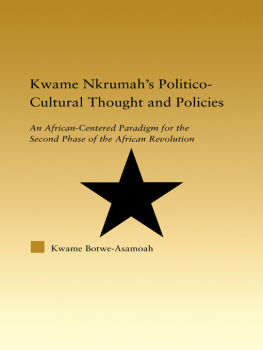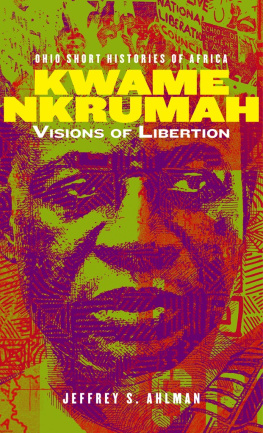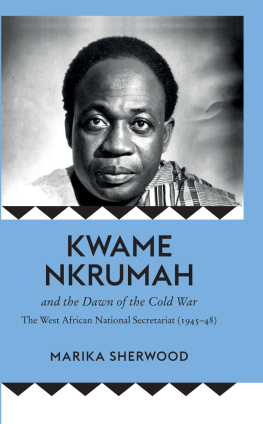Kwame Nkrumah - Neo-Colonialism, The Last Stage of Imperialism
Here you can read online Kwame Nkrumah - Neo-Colonialism, The Last Stage of Imperialism full text of the book (entire story) in english for free. Download pdf and epub, get meaning, cover and reviews about this ebook. year: 1965, genre: Politics. Description of the work, (preface) as well as reviews are available. Best literature library LitArk.com created for fans of good reading and offers a wide selection of genres:
Romance novel
Science fiction
Adventure
Detective
Science
History
Home and family
Prose
Art
Politics
Computer
Non-fiction
Religion
Business
Children
Humor
Choose a favorite category and find really read worthwhile books. Enjoy immersion in the world of imagination, feel the emotions of the characters or learn something new for yourself, make an fascinating discovery.
- Book:Neo-Colonialism, The Last Stage of Imperialism
- Author:
- Genre:
- Year:1965
- Rating:3 / 5
- Favourites:Add to favourites
- Your mark:
- 60
- 1
- 2
- 3
- 4
- 5
Neo-Colonialism, The Last Stage of Imperialism: summary, description and annotation
We offer to read an annotation, description, summary or preface (depends on what the author of the book "Neo-Colonialism, The Last Stage of Imperialism" wrote himself). If you haven't found the necessary information about the book — write in the comments, we will try to find it.
Neo-Colonialism, The Last Stage of Imperialism — read online for free the complete book (whole text) full work
Below is the text of the book, divided by pages. System saving the place of the last page read, allows you to conveniently read the book "Neo-Colonialism, The Last Stage of Imperialism" online for free, without having to search again every time where you left off. Put a bookmark, and you can go to the page where you finished reading at any time.
Font size:
Interval:
Bookmark:
This epub was created by minibug.
My previous and future work is available at https://minibug1021.github.io/
This book is dedicated to the Freedom Fighters of Africa living and dead.
"The enormous dimensions of finance-capital concentrated in a few hands and creating an extremely extensive network of close ties and relationships which involves not only the small and medium capitalists, but also even the very small; this, on the one hand, and on the other the bitter struggle against other national State groups of financiers for the partition of the world and the right to rule over other countriesthese two factors taken together cause the complete conversion of all the possessing classes to the side of imperialism. The signs of the times are a "general" enthusiasm regarding its prospects, a passionate defense of imperialism, and every possible camouflage of its real nature."
LENIN, Imperialism.
THE neo-colonialism of today represents imperialism in its final and perhaps its most dangerous stage. In the past it was possible to convert a country upon which a neo-colonial regime had been imposedEgypt in the nineteenth century is an exampleinto a colonial territory. Today this process is no longer feasible. Old-fashioned colonialism is by no means entirely abolished. It still constitutes an African problem, but it is everywhere on the retreat. Once a territory has become nominally independent it is no longer possible, as it was in the last century, to reverse the process. Existing colonies may linger on, but no new colonies will be created. In place of colonialism as the main instrument of imperialism we have today neo-colonialism.
The essence of neo-colonialism is that the State which is Subject to it is, in theory, independent and has all the outward trappings of international sovereignty. In reality its economic system and thus its political policy is directed from outside.
The methods and form of this direction can take various shapes. For example, in an extreme case the troops of the imperial power may garrison the territory of the neo-colonial State and control the government of it. More often, however, neo-colonialist control is exercised through economic or monetary means. The neo-colonial State may be obliged to take the manufactured products of the imperialist power to the exclusion of competing products from elsewhere. Control over government policy in the neo-colonial State may be secured by payments towards the cost of running the State, by the provision of civil servants in positions where they can dictate policy, and by monetary control over foreign exchange through the imposition of a banking system controlled by the imperial power.
Where neo-colonialism exists the power exercising control is often the State which formerly ruled the territory in question, but this is not necessarily so. For example, in the case of South Vietnam the former imperial power was France, but neo-colonial control of the State has now gone to the United States. It is possible that neo-colonial control may be exercised by a consortium of financial interests which are not specifically identifiable with any particular State. The control of the Congo by great international financial concerns is a case in point.
The result of neo-colonialism is that foreign capital is used for the exploitation rather than for the development of the less developed parts of the world. Investment under neo-colonialism increases rather than decreases the gap between the rich and the poor countries of the world.
The struggle against neo-colonialism is not aimed at excluding the capital of the developed world from operating in less developed countries. It is aimed at preventing the financial power of the developed countries being used in such a way as to impoverish the less developed.
Non-alignment, as practiced by Ghana and many other countries, is based on co-operation with all States whether they be capitalist, socialist or have a mixed economy. Such a policy, therefore, involves foreign investment from capitalist countries, but it must be invested in accordance with a national plan drawn up by the government of the non-aligned State with its own interests in mind. The issue is not what return the foreign investor receives on his investments. He may, in fact, do better for himself if he invests in a non-aligned country than if he invests in a neo-colonial one. The question is one of power. A State in the grip of neo-colonialism is not master of its own destiny. It is this factor which makes neo-colonialism such a serious threat to world peace. The growth of nuclear weapons has made out of date the old-fashioned balance of power which rested upon the ultimate sanction of a major war. Certainty of mutual mass destruction effectively prevents either of the great power blocs from threatening the other with the possibility of a world-wide war, and military conflict has thus become confined to 'limited wars'. For these neo-colonialism is the breeding ground.
Such wars can, of course, take place in countries which are not neo-colonialist controlled. Indeed their object may be to establish in a small but independent country a neo-colonialist regime. The evil of neo-colonialism is that it prevents the formation of those large units which would make impossible 'limited war'. To give one example: if Africa was united, no major power bloc would attempt to subdue it by limited war because from the very nature of limited war, what can be achieved by it is itself limited. It is only where small States exist that it is possible, by landing a few thousand marines or by financing a mercenary force, to secure a decisive result.
The restriction of military action of 'limited wars' is, however, no guarantee of world peace and is likely to be the factor which will ultimately involve the great power blocs in a world war, however much both are determined to avoid it.
Limited war, once embarked upon, achieves a momentum of its own. Of this, the war in South Vietnam is only one example. It escalates despite the desire of the great power blocs to keep it limited. While this particular war may be prevented from leading to a world conflict, the multiplication of similar limited wars can only have one endworld war and the terrible consequences of nuclear conflict.
Neo-colonialism is also the worst form of imperialism. For those who practice it, it means power without responsibility and for those who suffer from it, it means exploitation without redress. In the days of old-fashioned colonialism, the imperial Power had at least to explain and justify at home the actions it was taking abroad. In the colony those who served the ruling imperial power could at least look to its protection against any violent move by their opponents. With neo-colonialism neither is the case.
Above all, neo-colonialism, like colonialism before it, postpones the facing of the social issues which will have to be faced by the fully developed sector of the world before the danger of world war can be eliminated or the problem of world poverty resolved.
Neo-colonialism, like colonialism, is an attempt to export the social conflicts of the capitalist countries. The temporary success of this policy can be seen in the ever widening gap between the richer and the poorer nations of the world. But the internal contradictions and conflicts of neo-colonialism make it certain that it cannot endure as a permanent world policy. How it should be brought to an end is a problem that should be studied, above all, by the developed nations of the world, because it is they who will feel the full impact of the ultimate failure. The longer it continues the more certain it is that its inevitable collapse will destroy the social system of which they have made it a foundation.
Next pageFont size:
Interval:
Bookmark:
Similar books «Neo-Colonialism, The Last Stage of Imperialism»
Look at similar books to Neo-Colonialism, The Last Stage of Imperialism. We have selected literature similar in name and meaning in the hope of providing readers with more options to find new, interesting, not yet read works.
Discussion, reviews of the book Neo-Colonialism, The Last Stage of Imperialism and just readers' own opinions. Leave your comments, write what you think about the work, its meaning or the main characters. Specify what exactly you liked and what you didn't like, and why you think so.

